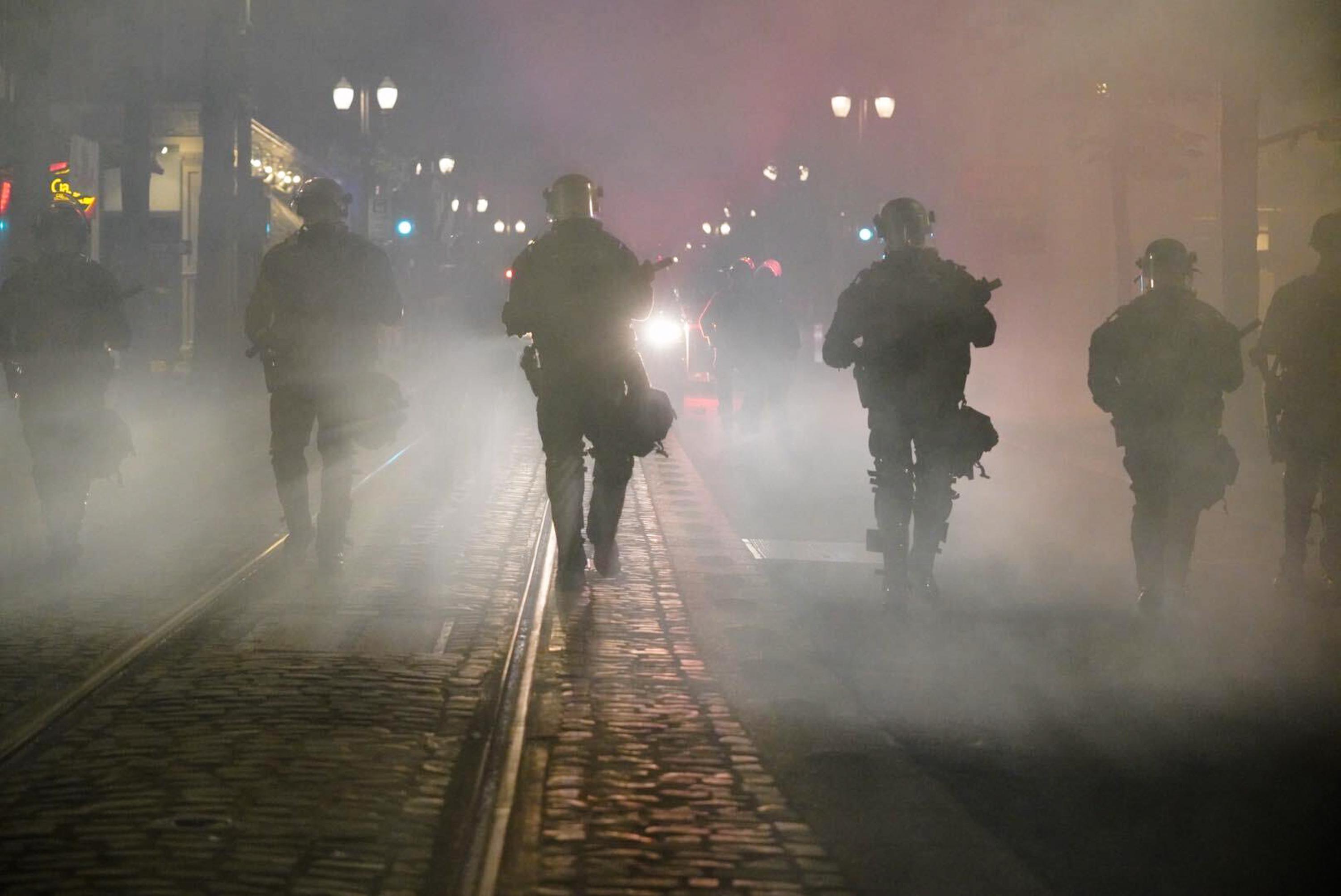UPDATED (10:40 p.m. PT) — Protesters have filed a class action lawsuit against the city of Portland for what they're calling "indiscriminate use" of tear gas during nightly protests following the killing of a Black man by police in Minneapolis last month. The suit is filed on behalf of two protesters, Nicholas Roberts and Michelle "Misha" Belden, and the advocacy group Don't Shoot Portland.

Police deploy tear gas during demonstrations in downtown Portland, Ore., Saturday, May 30, 2020. The death of George Floyd at the hands of a white Minneapolis police officer sparked nationwide protests against police brutality amid the COVID-19 pandemic.
Jonathan Levinson / OPB
Mayor Ted Wheeler’s office declined to comment on the lawsuit, but Wheeler himself visited protesters Friday evening and addressed the broader issue of tear gas, speaking through a bullhorn.
“I do not like the tear gas, I think it’s ugly — it is not focused enough,” Wheeler told the crowd.
A protester yelled, “What you going to do about it?”
“Seattle, today, banned the use of tear gas for thirty days except limited circumstances, I think we should do the same,” Wheeler answered.
On Friday in Seattle, Mayor Jenny Durkan and Police Chief Carmen Best agreed to a 30-day ban on tear gas, the Seattle Times reported.
Wheeler said there would be a formal announcement of a similar step in Portland on Saturday.
Protesters responded yelling, “Tonight!”
The civil rights complaint filed in federal court late Friday, seeks a temporary restraining order to force police from using tear gas in the city. In a statement, advocates said they also want a permanent ban on the use of the gas. The protesters argue the use of tear gas violates their First Amendment rights.
“We’re out screaming for justice for Black people and asking the state to stop its violence against us, and the City responds by using tear gas when we’re in the middle of a pandemic of respiratory disease,” said Teressa Raiford of Don’t Shoot Portland in a statement.
Public health officials have warned against the use of tear gas during the COVID-19 pandemic, because it can cause coughing, which can spread the virus.
"The use of tear gas is particularly dangerous at the present time because it is specifically designed to irritate the respiratory system and to cause people to expel mucus and aspirated saliva," the lawsuit states. "In the midst of a global pandemic, the deadly novel COVID-19 virus is known to spread principally through aspirated saliva and mucus."
Raiford noted that for weeks, the country shut down to slow the spread of the disease. Now, she said, it appears the city no longer cares about the risks as demonstrators confront police violence.
“This just demonstrates that they don’t care about the harm they’re causing, and that they are willing to literally kill us for standing up," Raiford said.
The lawsuit states that for more than a week people across the country and around world have turned out to protest police violence and white supremacy in the wake of killing of George Floyd in Minneapolis. The incident was captured on video and shows one former officer, Derek Chauvin, with his knee on Floyd’s neck for nearly 9 minutes as Floyd repeatedly yelled out, “I can’t breathe.”
Chauvin has been charged with second degree murder, while three other police officers, also fired in the wake of Floyd's death, have been charged with aiding and abetting murder.
"The Portland Police Bureau, like police departments all over the country, has responded with indiscriminate, unchecked, and unconstitutional violence against protesters," the lawsuit states. "In particular, PPB has repeatedly used chemical agents ('tear gas') against crowds of protesters, including plaintiffs who had committed no criminal acts, posed no threat of violence to any person, and were merely engaged in protected speech."
One of the attorneys bringing the case, Juan Chavez, with the Oregon Justice Resource Center, said across the country and in Portland police have had a militarized response to people's grief and demands for justice. He said the use of tear gas must stop.
"It only causes panic, it causes people to run in fear and possibly trip into things, fall into things, hurt themselves in other ways and it spreads, it spreads with wind and hurts people that have nothing to do with protesting," Chavez said in an interview.
Earlier this week, two Portland city commissioners asked for a ban on tear gas as well. Mayor Ted Wheeler, who is also the police commissioner, has said he would support a ban, if police had a suitable alternative for controlling crowds.
On Thursday, Portland Police Association president Daryl Turner, whose union represents rank-and-file officers, told OPB's Think Out Loud that using tear gas — also known as "CS gas" — is considered a "best practice" by police when it comes to crowd control.
"If they deem that we can't use it, we'll have to use something else, a less lethal option," Turner said. "But what it does is it also causes police to have to use more hands on force because they take one option away that could help disburse crowds, help keep people safe and it has a short time period that it affect people and wears off easily with washing down with water."
On Friday night Wheeler tweeted that he was clamping down on a different crowd control tactic that officers used during protests early Friday morning: a sonic cannon known as a Long Range Acoustic Device, or LRAD.
"Effective immediately, I have directed @PortlandPolice to use LRAD only to share information and not as a sonic warning tone function," Wheeler said on Twitter.